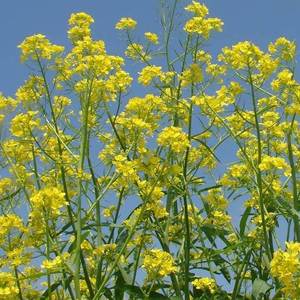1st Nuseed Carinata shipment demonstrates sustainability, supply

Photo: University of Florida Extension
June 11, 2020
BY Nuseed
Saipol, the main subsidiary of Groupe Avril, Europe’s largest producer of biodiesel, has received the first Nuseed Carinata grain shipment at its processing facility in Rouen, France. Grown as a scalable cover crop in Argentina, it will be processed into a renewable fuel with best-in-class greenhouse gas (GHG) reduction.
This follows an independent SCS Global audit and certification by the Roundtable on Sustainable Biomaterials, a globally recognized leader in sustainability, which confirmed substantial carbon reduction with the use of Nuseed Carinata as a biofuel feedstock.
Advertisement
Advertisement
“Nuseed Carinata, a proven high performance, purpose-built biofuel feedstock is capable of replacing petroleum fuels with a substantial reduction in greenhouse gas emissions,” said Romain Lebas, head of sustainability and low GHG sourcing for Saipol. “The RSB certification verifies that the reduction is best in class, giving us complete confidence in maximizing the use of carinata as a feedstock in our biofuels.”
Rolf Hogan, RSB’s executive director, said, “RSB certification is a fantastic achievement for Nuseed Carinata. A fully independent third-party audit process analyzes absolutely every production and supply chain step to verify the GHG reduction—meaning that Avril can have absolute confidence in the climate benefit of this feedstock. Factors that contribute to Nuseed Carinata’s excellent GHG reduction include its high biomass and carbon sequestration from the atmosphere to the soil, as well as the fact that it is grown in rotation with other crops and does not require additional farmland. This is alongside a range of other environmental and social benefits that Nuseed has demonstrated in order to achieve RSB sustainability certification.”
Advertisement
Advertisement
Nuseed added carinata to its global portfolio in November 2019, following a successful pilot project in Argentina and acquiring specific carinata technology from the crop’s developer (Agrisoma).
Experts from the development team joined Nuseed and, by working closely with Nuseed’s South America and European teams, have accelerated commercialization by building the Nuseed value chain with R&D, contract growers, industry partners, and RSB certified delivery to the end-use customer in just five months.
“We connect R&D, regulatory, contract growers, industry, logistics, and end-use customers for a sustainable solution to a very real problem—the world’s need for fuel and its impact on climate change,” said Glenn Johnston, Nuseed head of regulatory affairs for carinata. “We’ve demonstrated both supply and sustainability through our work with Argentinian growers and achieving RSB certification with this first commercial Nuseed Carinata shipment.”
Related Stories
The USDA significantly increased its estimate for 2025-’26 soybean oil use in biofuel production in its latest World Agricultural Supply and Demand Estimates report, released July 11. The outlook for soybean production was revised down.
U.S. fuel ethanol capacity fell slightly in April, while biodiesel and renewable diesel capacity held steady, according to data released by the U.S. EIA on June 30. Feedstock consumption was down when compared to the previous month.
The U.S. EPA on July 8 hosted virtual public hearing to gather input on the agency’s recently released proposed rule to set 2026 and 2027 RFS RVOs. Members of the biofuel industry were among those to offer testimony during the event.
The USDA’s Risk Management Agency is implementing multiple changes to the Camelina pilot insurance program for the 2026 and succeeding crop years. The changes will expand coverage options and provide greater flexibility for producers.
The USDA’s National Agricultural Statistics Service on June 30 released its annual Acreage report, estimating that 83.4 million acres of soybeans have been planted in the U.S. this year, down 4% when compared to 2024.
Upcoming Events










